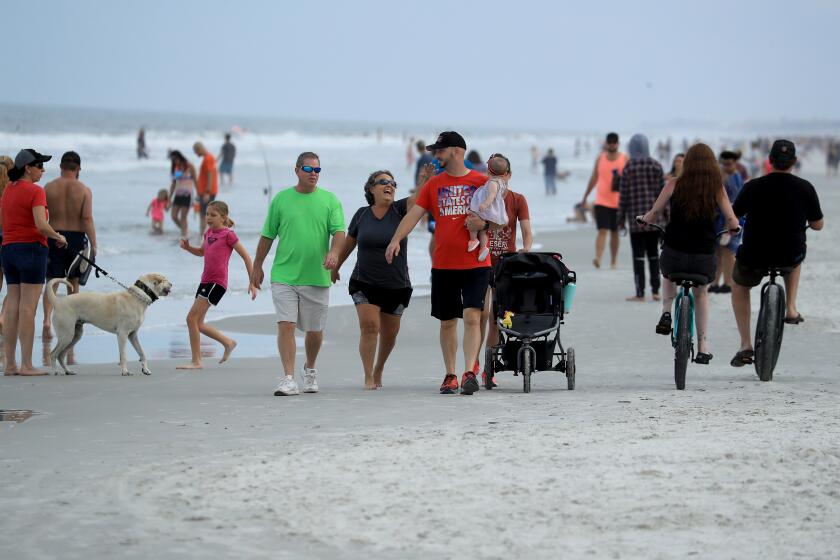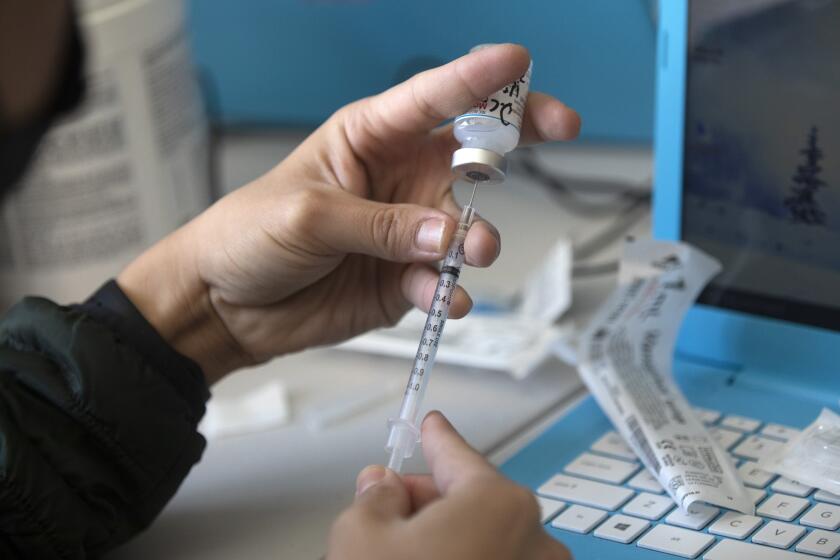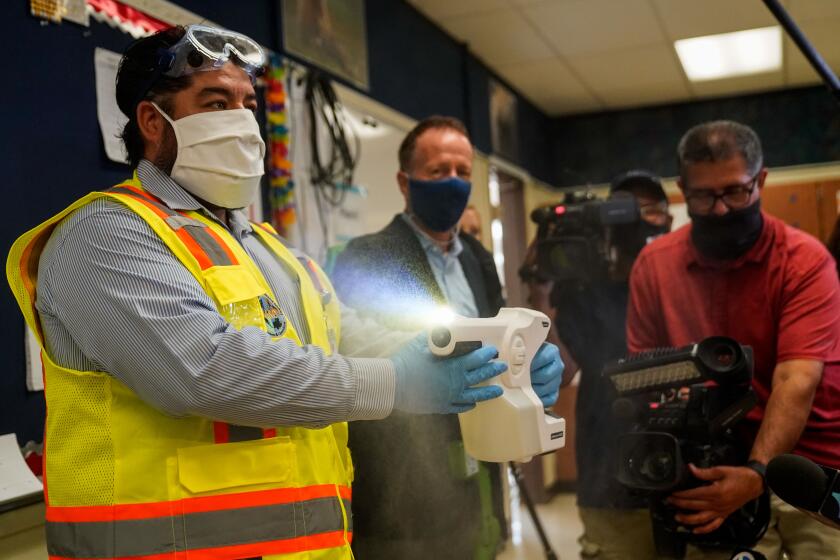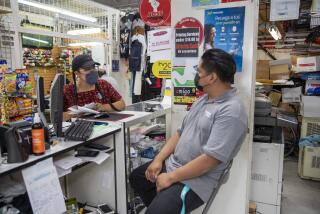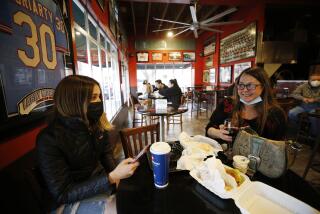How quickly will L.A. restaurants, gyms and schools reopen? Here’s what we know
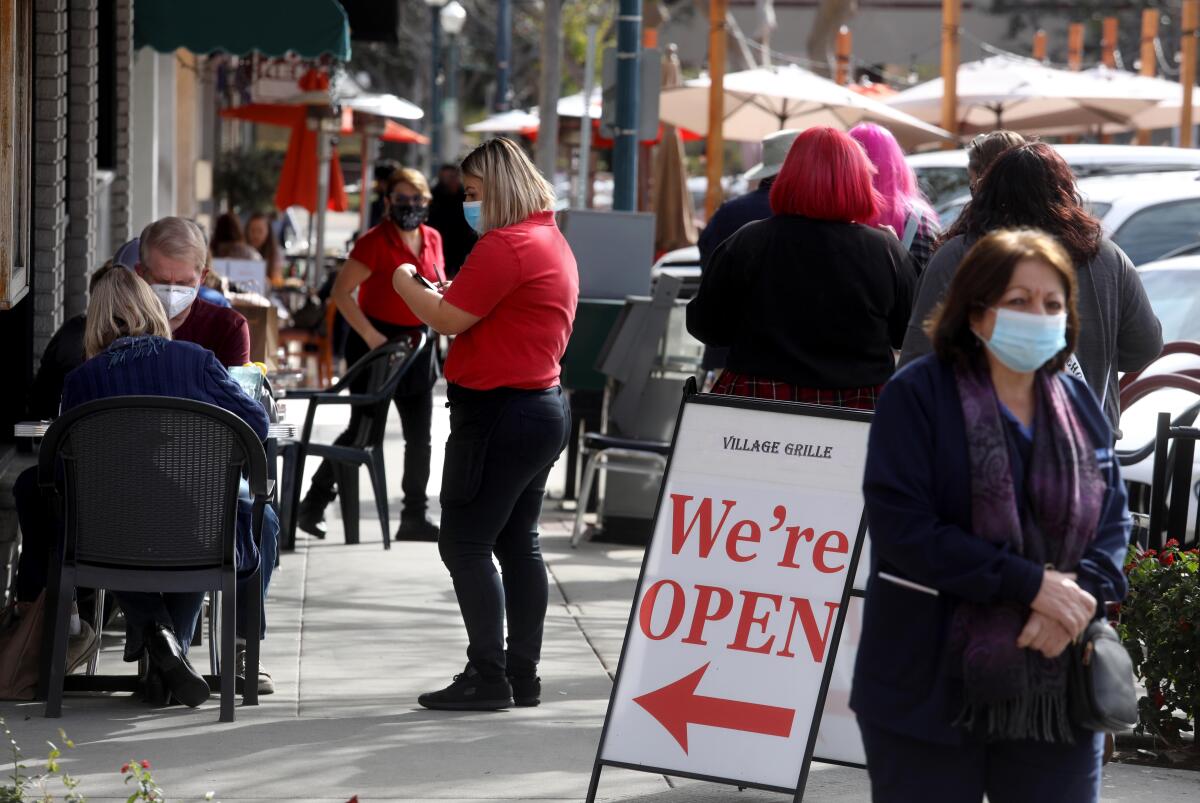
- Share via
New California pandemic reopening rules could allow more parts of the Southern California economy to kick back into gear as soon as this week.
It still depends on when the region hits certain coronavirus-related benchmarks. And even then, there is still a question as to exactly what businesses and facilities would open and when.
Here is what we know:
What do the new rules say?
Of the state’s available COVID-19 vaccines, 40% will now be dedicated to residents in California’s most disadvantaged areas — a massive commitment officials say will help address glaring inequities in vaccine administration.
Once 2 million doses have been administered in these communities, the state will relax the threshold required for a county to exit the purple, or most restrictive, category of the state’s four-tier, color-coded reopening roadmap.
Currently, counties must have an adjusted daily rate at or below seven new coronavirus cases per 100,000 people to move into the more permissive red tier. But after the state hits its 2-million-dose goal, which it likely will do this week, counties with a case rate of up to 10 new cases per day per 100,000 people would become eligible for the red tier.
According to state data, almost 1.88 million vaccine doses had been administered as of Monday in the targeted communities — those in the lowest quartile of the California Healthy Places index.
Florida and California responded to the COVID-19 pandemic in vastly different ways, but comparing outcomes isn’t so simple. Here’s what the numbers tell us.
So where does Southern California stand?
L.A., Orange and San Bernardino counties were among those that had logged adjusted case rates of fewer than 10 new cases per day per 100,000 people last week. Should they fall below that threshold again when the state updates its tiering data Tuesday, it appears those counties would be allowed to progress to the next level of reopenings.
L.A. County officials have said they believe that once the county’s case rates hit the targeted level, some reopenings could occur within 48 hours.
What businesses reopen in the red tier?
Counties in the red tier can allow indoor restaurant dining and movie theaters to reopen at 25% capacity or up to 100 people, whichever is less. Indoor gyms and dance and yoga studios can open at 10% capacity. Museums, zoos and aquariums can open indoor activities at 25% capacity, and nonessential stores and libraries can open at 50% capacity, up from 25% capacity.
It’s OK to have small, maskless gatherings indoors if everyone is vaccinated, but the CDC still warns against nonessential travel.
The red tier, however, still keeps a number of venues closed — including convention centers; bars, breweries and distilleries where no meals are provided; indoor swimming pools; indoor entertainment areas such as bowling alleys, escape rooms and laser tag facilities; and indoor card rooms.
Counties can allow such activities, though largely in a modified fashion, when they move into the orange and yellow tiers.
Do counties have discretion to be more stringent than the state?
Yes, they do.
All the tier rules serve as a baseline for local health agencies, which can adopt even stricter regulations if they feel it’s necessary, though they cannot be more lenient.
“As we plan to move into the red tier, where additional reopenings will be permitted, we’re looking closely at the science to understand what practices can help reduce community transmission of COVID-19,” Los Angeles County Public Health Director Barbara Ferrer said.
She pointed to a study by the U.S. Centers for Disease Control and Prevention, which found that the rate of COVID-19 deaths slowed in counties where states required masks, and sped up in counties where states allowed on-site restaurant dining.
“That’s something that we’ll need to take into account as we begin more reopenings in our restaurants,” she said.
L.A. Unified School District is aiming to reopen secondary schools in late April under a timetable announced Monday by Supt. Austin Beutner.
What’s the timeline for L.A. schools?
Officials said Monday that middle and high schools throughout Los Angeles County could be eligible to open within days, with L.A. Unified aiming for a late April reopening of its secondary campuses.
Several sticking points, however, could lead to further delays in the nation’s second-largest school district, including the time it would take to get teachers and school staff fully vaccinated against COVID-19 and the ability of the district and its teachers union to reach an agreement about school-day schedules and working conditions.
Elementary-school campuses in L.A. County became eligible to reopen Feb. 16, but middle and high schools have had to wait until viral levels in the community are lower because older children are more likely to develop COVID-19. Also, Ferrer said, their class schedules typically require more intermingling.
“In the elementary schools, it’s really easy to keep people in relatively stable groups,” Ferrer said at a media briefing Monday. “Intermingling with lots and lots of people is what makes it easier for this virus to spread, and in high schools and junior highs that intermingling is going to be a lot harder to manage.”
An announcement by L.A. schools chief Austin Beutner about the reopening of secondary schools came one week after he set a goal of mid-April for elementary schools, stepping back slightly from an original target of April 9. Under county health guidelines, elementary-school campuses could have opened last month.
L.A. Unified is among the school systems reopening much more slowly. Some, including Long Beach, are moving faster because they have been able to obtain access to vaccines sooner.
Other school districts, mostly in more affluent areas, began reopening without vaccines. State and federal guidelines have encouraged schools to open without vaccines for employees, provided that strict safety protocols are followed.
What is happening beyond Southern California?
Based on the latest state data, 12 counties could potentially move ahead this week into a less restrictive reopening tier, including nine currently in the purple category: Alameda, Butte, Calaveras, Imperial, Mono, Placer, Santa Cruz, Solano and Tuolumne.
Santa Clara, San Francisco, San Luis Obispo, El Dorado, Napa, Lassen and Modoc entered the red tier last week.
Del Norte, Humboldt, Trinity, Shasta, Plumas, Yolo, Marin, San Mateo and Mariposa counties were already in the red tier. Two counties — Sierra and Alpine — have progressed a step further, into the orange tier.
More to Read
Sign up for Essential California
The most important California stories and recommendations in your inbox every morning.
You may occasionally receive promotional content from the Los Angeles Times.
